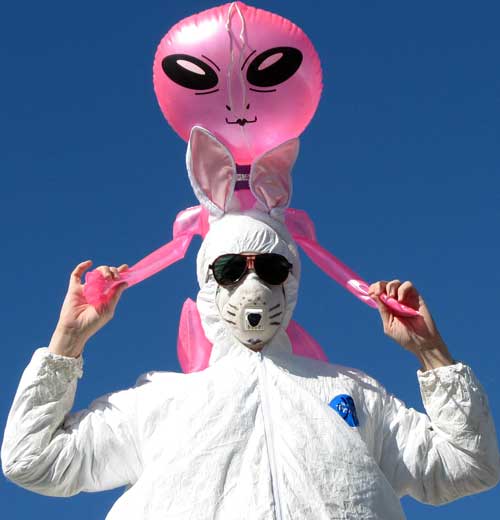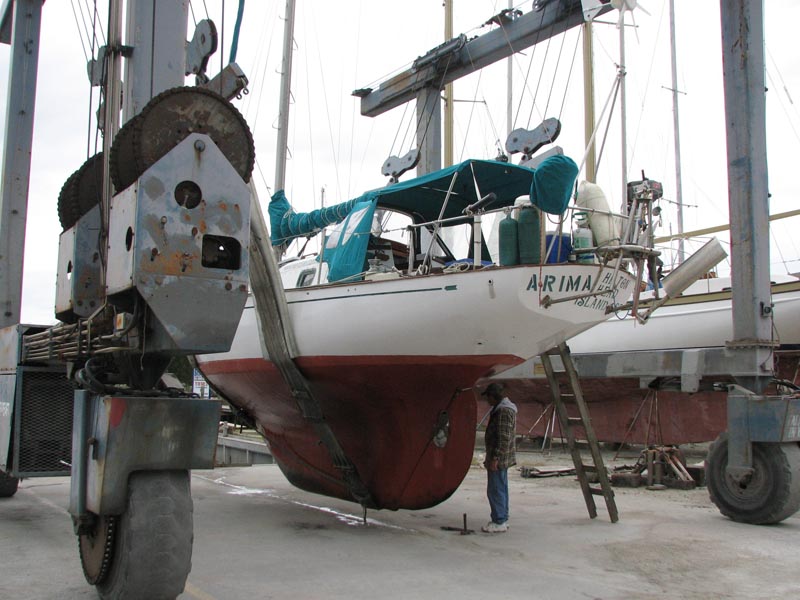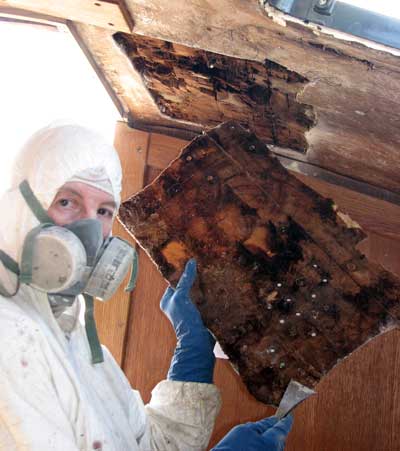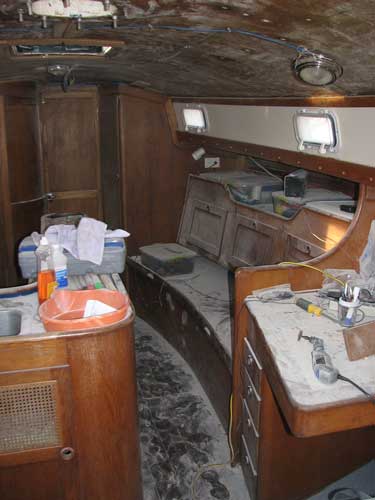The “lounge” here at the boatyard isn’t much. It’s back behind the office, in a cinderblock building. There’s a soda machine, a coin-operated washer and dryer, and a couple of cast-off tables and chairs. One corner has a shelf full of books to trade, and under the sink is the “free table,” where boaters can swap their unneeded junk for other boaters’ unneeded junk. Mainly, the lounge is an air-conditioned, grubby space that provides access to the restrooms and showers and a reliable old-fashioned landline telephone.
So when a small incongruous sign appeared in the lounge one Friday evening, saying “Potluck, Saturday 6 pm. BYO everything,” I chuckled. “That must be the Australians,” I commented to Barry.
Boats here in the yard come and go by way of the Travelift, which plucks them out of the water and gently carries them, in woven slings, to their assigned place in the yard. A few mornings earlier, alerted by the distinctive sound of the Travelift nearby, I popped my head out, prairie dog-style, and reported to Barry down below. “Honey Moon, Mooloolaba, Australia. Definitely a world cruiser.” We met Don and Aggie a little later. “Welcome to the neighborhood,” I said.
The two of them have been cruising for decades. They’ve been on their current circumnavigation for a few years, having done the Red Sea route to the Mediterranean and then cruised the French Canals and Holland before coming across to the Caribbean. Down in Trinidad, they were looking for a spot to store their boat while they flew home, and they heard about Bock Marine. It was just what they were looking for, and only a few thousand miles away. No problem for someone who had sailed halfway around the world from Australia.
Once they were established in the yard, they launched into their list of projects, Aggie toting vast quantities of laundry on a small folding bike to the lounge. Whenever I walked past the washing machine, her distinctive koala-print bag was sitting on top. Don stayed close to the boat, working and supervising the sandblasting and welding. But they’d been through this process before, many times, so they paced themselves, allowing time for a social life. Hence the potluck.
That Saturday evening in the lounge, we discovered a number of people living and working in their boats who we hadn’t met. Albertine and Joop, from the Netherlands, were parked right next to the Travelift. Walter’s boat is near the bridge. We knew Dan, whose Alberg 35 is over in our area, but we hadn’t yet met Kevin, on Dynamic Duo. His catamaran was next to Dan. There’s a fellow named Steven, whose Irish accent is almost incomprehensible, and his partner, a woman from Taiwan who never speaks at all. They’re working on a huge mysterious sailboat back in the “sandpit,” as Steven calls it.
In addition to the folks at the potluck, I knew of five others who hadn’t attended. That meant that even on a Saturday evening, when the boatyard was closed, there were about 20 people working and staying on their boats here. We are all grinding and sanding and painting and building, and at the same time, we all have to sleep and eat and carry things up and down a ladder a hundred times a day. It’s a crazy lifestyle, and it’s nice to know we’re not alone.
After the potluck, the ice was broken. Every few evenings, we’d hear laughter coming from one boat or another, evidence of a little get-together. Albertine and Joop invited us to dinner on their boat, along with Don and Aggie. We watched the sun set over the water from the cockpit, enjoying drinks and Indonesian food. It was just like having dinner in a little marina, except for the 10-foot ladder. The next day, the Travelift picked them up and dropped them back in the water, and they headed north to New England.
Kevin launched a few days later. He spent the first night tied to the dock, and we went aboard for beers and conversation. What a joy to be on a boat that was actually floating!
I wanted to host a gathering, too, but our interior is so bad, we’re not even sleeping in the boat. So I hauled the barbecue out of storage and invited Gigi and Val and Don and Aggie over for hamburgers. There were two challenges: Where to attach the marine barbecue, and how to deal with a 25-knot breeze. I parked the van sideways as a giant windbreak, and then we rolled a 10-foot-tall scaffold over to it. Barry clamped the barbecue onto the scaffold (marine barbecues are designed to attach to rails or pipes and don’t have legs), and we spread our fixings and watermelon and beverages out on the scaffold. Then we made a circle of chairs and sat under the stars, eating and talking in the shadow of the boats.
When a boat goes back into the water, it’s a happy time. But it’s hard for me, because it means another friend is gone. What I find most depressing is when friends leave, but their boats stay here. I was depressed for a couple of days when Don and Aggie flew home to Australia, leaving their boat silent and tarped. And for another couple of days when Gigi and Val drove north to Quebec. This week was the worst, when the yard workers took their summer vacation as well. I miss the smiling faces of Randy and Larry and Dale!
But we are not completely alone. Over in the sandpit, we often see Steven working at the top of his mast, the tallest in the boatyard. He’s strangely attired in full foul-weather gear as he reeves halyards and adjusts rigging. Last year, he says, he went up unprotected and discovered a wasp’s nest. “The bastards never die, they just kept stinging me over and over, all the way down,” he complained.
Dan, on Arima, hurried to launch his boat before the yard closed for the week. But the next day, he found that his shaft was leaking, so he didn’t actually leave. He’s tied to the dock, bilge pumps running, waiting for the yard workers to return. I’m sorry for his misfortune, but it’s nice to see his smiling face around the place.
The best company in the boatyard right now is not even human. I don’t mean the palmetto bugs — we had a fat brown 2-inch visitor to the boat last week, and I could do without him. I mean the kitties.
When we arrived, the boatyard had three cats. Now that Gigi has gone north, I’ve taken on the job of feeding them early in the morning — 5:30 am, to be precise. “Hello, kitty!” I sing, coaxing a white-and-gray calico closer with treats. She nervously stuffs herself with dry cat food, her belly close to the ground. Then she stands up, looks around, and begins to make a strange meeowing-yowling noise.
It’s a kitten call! From across the parking lot, four babies tumble out of the “kitten hole” a small irregular opening that Dale cut for them in the wall of the steel work building. They scamper out and hide under the crane, and the black one ventures halfway across the parking lot. Then a big scary garbage truck comes by, and Mom quickly leads them back to safety.
Play time is over, both for us and for them. But it’s a gentle reminder that it’s not all work here in the boatyard. Social butterflies that we are, we will always find company, even of the feline kind.




 Instead, we have been working on fixing up the deck’s many holes, some of which were letting water (and then rot) into the balsa core. There are one or two that have grown well beyond a little rot around a hole and instead became big areas to patch. Having done this already in the forward portion of the boat, we were relatively old hands, and one lesson I had learned was that cleanup is a big job, so why not make a big HUGE mess all at once, then just do the cleanup once.
Instead, we have been working on fixing up the deck’s many holes, some of which were letting water (and then rot) into the balsa core. There are one or two that have grown well beyond a little rot around a hole and instead became big areas to patch. Having done this already in the forward portion of the boat, we were relatively old hands, and one lesson I had learned was that cleanup is a big job, so why not make a big HUGE mess all at once, then just do the cleanup once. I think this was a good choice, but we sure did make a mess of the boat by now. As I write this, we just have to sweep and vacuum up all the dust, and then we can start putting some things back together. With any luck, it will never get to be quite this big a mess inside again!
I think this was a good choice, but we sure did make a mess of the boat by now. As I write this, we just have to sweep and vacuum up all the dust, and then we can start putting some things back together. With any luck, it will never get to be quite this big a mess inside again!